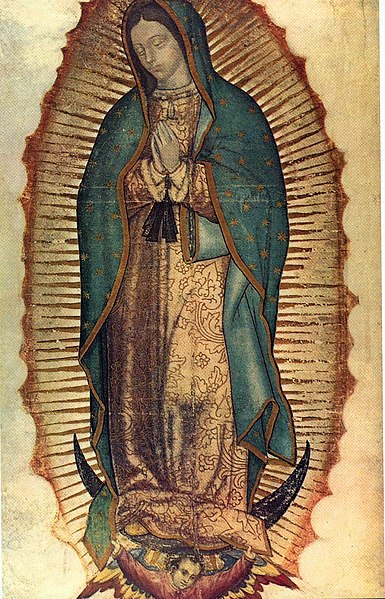The Virgin Mary, El Greco, 1590s
Gospel (Luke 2:16-21)
The shepherds went in haste to Bethlehem and found Mary and Joseph,
and the infant lying in the manger.
When they saw this,
they made known the message
that had been told them about this child.
All who heard it were amazed
by what had been told them by the shepherds.
And Mary kept all these things,
reflecting on them in her heart.
Then the shepherds returned,
glorifying and praising God
for all they had heard and seen,
just as it had been told to them.
When eight days were completed for his circumcision,
he was named Jesus, the name given him by the angel
before he was conceived in the womb.
+++
Pope Benedict blessing members of Pueri Cantores (Boys' Choir Association), 30 December 2010
Pope Benedict’s Message for World Day of Peace 2011
Religious Freedom, the Path to Peace
Religious freedom in the world
14. Finally I wish to say a word to the Christian communities suffering from persecution, discrimination, violence and intolerance, particularly in Asia, in Africa, in the Middle East and especially in the Holy Land, a place chosen and blessed by God. I assure them once more of my paternal affection and prayers, and I ask all those in authority to act promptly to end every injustice against the Christians living in those lands. In the face of present difficulties, may Christ’s followers not lose heart, for witnessing to the Gospel is, and always will be, a sign of contradiction.
Let us take to heart the words of the Lord Jesus: “Blessed are those who mourn, for they shall be comforted … Blessed are those who hunger and thirst for righteousness, for they shall be satisfied … Blessed are you when men revile you and persecute you and utter all kinds of evil against you falsely on my account. Rejoice and be glad, for your reward is great in heaven” (Mt 5:4-12). Then let us renew “the pledge we give to be forgiving and to pardon when we invoke God’s forgiveness in the Our Father. We ourselves lay down the condition and the extent of the mercy we ask for when we say: ‘And forgive us our debts, as we have forgiven those who are in debt to us’ (Mt 6:12)”.[17] Violence is not overcome by violence. May our cries of pain always be accompanied by faith, by hope and by the witness of our love of God. I also express my hope that in the West, and especially in Europe, there will be an end to hostility and prejudice against Christians because they are resolved to orient their lives in a way consistent with the values and principles expressed in the Gospel. May Europe rather be reconciled to its own Christian roots, which are fundamental for understanding its past, present and future role in history; in this way it will come to experience justice, concord and peace by cultivating a sincere dialogue with all peoples.
Full text here.
+++
A Feast Rich in Names, Meaning and Mission
By Father Thomas Rosica, CSB
TORONTO, DEC. 24, 2010 (Zenit.org).- The Jewish Feast of Rosh Hashanah, meaning literally the “beginning of the year,” occurs on the first of the Hebrew month Tishre and inaugurates the solemn Jewish season that concludes with Yom Kippur.
In the Bible, the Jewish New Year Festival is called Day of the Sounding of the Shofar and Memorial of the Blowing of the Shofar (ram's horn). This instrument is designed to sound the alarm of the forthcoming solemn season, to awaken Jewry to prayer and repentance. It serves as a call to remember the historical events that made Israel a people, whether at Mount Sinai or on its entrance into Israel, or on the occasion of the proclamation of the Jubilee year. In Jewish liturgy, this feast also has two other names: Day of Memorial and Day of Judgment. Each of the different names of the festival conveys one of its special characteristics.
Full text here.
+++
The Virgin in Prayer, Sassoferrato, 1640-50
What's in a Name?
Fr Fabian Radcliffe OP
'Holy Mary, Mother of God': we say this whenever we say the Hail Mary. We say it so often that we can easily forget what a strong, startling, even shocking, phrase it is. How can Mary, or any woman for that matter, be literally Mother of God? God has no beginning. It is impossible for a human woman to be Mother of God. It sounds more like pagan myth than Christian doctrine.
But no: it is the Christian and Catholic faith that Mary is Mother of God; so it is necessary to understand it properly. The difficulty is overcome if instead we say that Mary is the 'God-bearer'. This is in fact what the Greek word theotokos means: 'God-bearer', and therefore 'Mother of God', because the one she bears is God. This title had been given her in popular devotion from the second century onwards, and it was confirmed by the Council of Ephesus in AD 431 as a sure way of asserting the full divinity of her Son.
We also hear this phrase in all the Eucharistic Prayers. There it is linked with her title 'Virgin' in such a way that the two tend to be merged into the paradoxical title 'Virgin-Mother'. Mary is indeed both virgin and mother. 'Virgin' expresses the initiative of God and therefore the full divinity of her Son. 'Mother' expresses Mary's full cooperation and therefore also His full humanity.
Full text here.






























.svg/800px-Flag_of_Scotland_(navy_blue).svg.png)



